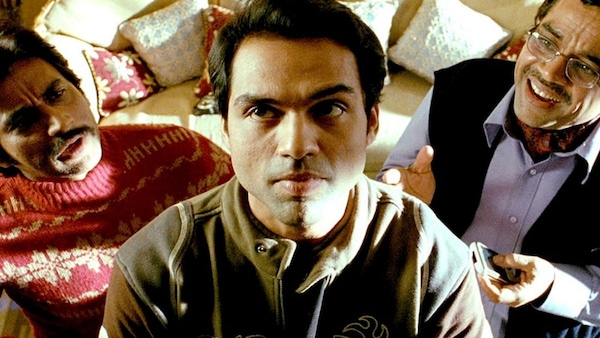Oye Lucky! Lucky Oye! clocks in 13 years of release: Notes on Dibakar Banerjee’s comedy on class conflict
Oye Lucky! Lucky Oye! was never meant to be a success story. It was the story of a man desperate to break out of the hamster wheel of poverty.

Last Updated: 04.18 PM, Dec 01, 2021
Dibakar Banerjee’s sophomore directorial Oye Lucky! Lucky Oye! could not have released at an un-luckier time. The movie hit theatres on November 28, 2008, two days after the tragic 26/11 Mumbai terror attacks. Understandably, the panic around stepping out of one’s safety net pitifully affected the film’s box office collection. Although the film later went on to win the National Award for Best Popular Film, the scale of the tragedy utterly obscured the film’s release.
Banerjee’s humble heist movie, since its release 13 years ago, has since been rediscovered by cinephiles and critics, who have liberally lauded this layered and nuanced film. Starring Abhay Deol as the protagonist Lucky, the film is loosely inspired by the life of ‘super chor’ Bunty, a notorious real-life con man from Delhi.
With a featherlight tone and gentle comedy, Oye Lucky! Lucky Oye! keenly explores class conflicts plaguing Indian society. The film moves quickly, as if brimming with the impatient energy of a man desperate to break out of the poverty cycle. In a 2008 interview with Rediff, Banerjee described how the film is a “fable of modern India.”
“I see the country as a pressure cooker of unrealized dreams and ambitions. On one hand, there is a class that has made great progress and earned a lot of money. It flaunts its newfound wealth all the time. On the other hand, there is stark poverty. It is not easy for a common man, and particularly a poor person, to break through the innumerable barriers and achieve success,” he said of the film, stressing how the film has a graver undertone, despite its sustained cheeriness.
Lucky is street smart and ambitious, and has a natural flair for the sleight of hand. He is also charming, which greatly works in his favour. He chooses a life of petty crime for himself, which acquaints him with Gogi Arora (played by Paresh Rawal), a criminal who uses Lucky to his own aid. He later crosses paths with Dr Handa (also played by Rawal), who also betrays him.
Casting Paresh Rawal as Lucky’s three father figures was bold, but effective. The absence of a loving father figure in Lucky’s life propelled him to hanker for approval from every father figure he comes across — and is betrayed every time. One of the songs that recur throughout the film is Chahiye Thora Pyaar, which essentially sums up Lucky’s predicament. Several critics had remarked how Lucky’s choice of career of hoarding every expensive item — from state of the art music systems, laptops, TV sets and even pet dogs — was a result of him continuously, and unsuccessfully, trying to fill the void in his life — the void of love and acceptance.
Beyond being a crime caper, Oye Lucky! Lucky Oye! was also an authentic representation of the West Delhi milieu. The film turns its gaze from the arresting forts and gardens of the city to the dingy, sinuous bylanes perennially in a state of commotion. Banerjee’s subjects are the people of Delhi. The movie painted in bold the contrast between Lucky’s life and the ones who he robs. But he is no Robin Hood, and neither was Dibakar interested in turning Lucky into the film’s moral compass. He is just a product of his circumstances —morally ambiguous, who derives gratification from outwitting others, much like Frank Abagnale (Leonardo DiCaprio) in Catch Me If You Can.
There have been several aspirational tales in recent years on unlikely protagonists destroying the hamster wheel of systemic poverty. While Zoya Akhtar’s Gully Boy (2019) used underground rap as the clarion call for change, The White Tiger (2021) was a biting satire on the apathy of the privileged, and how for some, the only way to rear one’s head is to slice the one on the upper social rung. Oye Lucky! Lucky Oye! was none of these things. For one, it was never meant to be a success story. It is aware that democracy is a myth, and privilege is non-negotiable.
Yet, there is no denying that Oye Lucky! Lucky Oye! wasn’t without its share of flaws. The modus operandi of the protagonist gets too simplistic after a point to be believable enough. Even the plot becomes repetitive. But Deol and Dibakar ensure that there is enough humour at all times to keep the audience engaged till the end.
Watch Oye Lucky! Lucky Oye! here .

